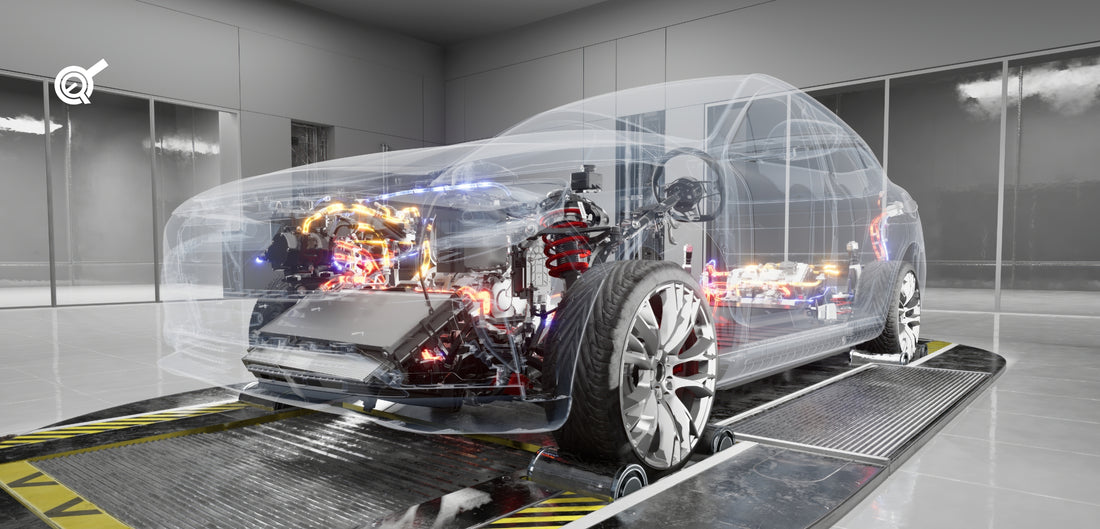El futuro de los vehículos eléctricos (VE) está lleno de promesas. A medida que más personas adoptan el transporte sostenible, los fabricantes de VE están utilizando tecnologías avanzadas para transformar la industria. Estas innovaciones están haciendo que la producción sea más rápida, económica y eficiente, ayudando a satisfacer la creciente demanda. Desde la automatización con IA hasta nuevas tecnologías de baterías y métodos de fabricación mejorados, la industria de los VE está cambiando rápidamente. En este artículo, exploraremos las tendencias que están dando forma al futuro de la fabricación de VE.

Tecnologías emergentes que están revolucionando la fabricación de vehículos eléctricos
La transformación de la fabricación de vehículos eléctricos tiene mucho que ver con las tecnologías actuales. Estas innovaciones están haciendo que la producción sea más eficiente y ayudan a crear vehículos más inteligentes y ecológicos, listos para liderar el futuro del transporte.
Automatización impulsada por IA
Una de las tecnologías clave que impulsa la revolución en la producción de VE es la automatización con IA. Imagina una línea de ensamblaje capaz de supervisarse a sí misma, realizar ajustes en tiempo real y garantizar que cada VE se fabrique a la perfección — todo con una mínima intervención humana. Ese es el poder de la IA en la fabricación de vehículos eléctricos. Estos sistemas inteligentes pueden detectar y resolver problemas rápidamente, optimizar los cronogramas de producción e incluso mejorar el control de calidad, garantizando que cada vehículo cumpla con altos estándares de seguridad y rendimiento.

Tecnología de baterías para VE
Pero, ¿qué pasa con el futuro de las baterías para VE? En lo que respecta a la tecnología de baterías para vehículos eléctricos, estamos viendo algunos de los avances más emocionantes hasta la fecha. Las baterías de estado sólido están en el horizonte y prometen mayor vida útil, cargas más rápidas y mejor seguridad en comparación con las baterías tradicionales de iones de litio. Para los fabricantes de VE, esto significa construir vehículos con mejor autonomía y menores costos de producción, lo que en última instancia hace que los vehículos eléctricos sean más accesibles para los consumidores.
Aún mejor, las baterías de estado sólido pueden ser más pequeñas y ligeras que sus homólogas de iones de litio, lo que podría permitir que los autos eléctricos sean más compactos y livianos o alcancen una mayor autonomía sin aumentar tamaño ni peso.
Estos avances, desde la automatización con IA hasta la tecnología de baterías avanzada, también mejoran las estaciones de carga de vehículos eléctricos y están allanando el camino hacia vehículos eléctricos más eficientes, confiables y sostenibles.
El papel de la automatización en la optimización de la producción de VE
Automatización industrial es ahora el núcleo de la fabricación moderna de VE. Con el uso de robótica, actuadores lineales y sistemas de control de movimiento, la producción se ha vuelto más eficiente que nunca. ¿Pero por qué la robótica y el control de movimiento son cruciales en la producción de VE?
Robótica y automatización en la producción de VE
En las plantas de fabricación de vehículos eléctricos actuales, la robótica es clave para aumentar la velocidad de producción, minimizar errores y escalar con eficiencia. Las líneas de ensamblaje impulsadas por IA son comunes, donde los robots se encargan de tareas complejas como soldar, pintar y ensamblar piezas con gran precisión. Estos sistemas no solo aceleran la producción, sino que también garantizan resultados constantes y de alta calidad para cada vehículo.
Actuadores lineales y control de movimiento
Los actuadores lineales y los sistemas de control de movimiento pueden parecer pequeños, pero son vitales para la producción de VE. Aseguran movimientos mecánicos suaves y precisos durante el proceso de fabricación. Por ejemplo, los sistemas de control de movimiento ajustan la altura de los componentes durante el ensamblaje, garantizando una alineación perfecta. Estos sistemas permiten a los fabricantes automatizar tareas complejas, reducir errores humanos y aumentar la eficiencia general.
Así es como la automatización en la producción de vehículos eléctricos está marcando la diferencia:
- Líneas de ensamblaje impulsadas por IA que aumentan la velocidad y la precisión.
- Robótica para tareas de precisión que mejora la consistencia.
- Actuadores lineales avanzados para control de movimiento para optimizar el movimiento.
- Sistemas automatizados de aseguramiento de calidad que mantienen estándares de primer nivel.
Toda esta automatización permite a los fabricantes satisfacer la creciente demanda mientras controlan los costos y mantienen la alta calidad que esperan los consumidores de hoy.
En general, los productos de movimiento lineal desempeñan un papel crucial en diversas aplicaciones automotrices, incluidos los deportes motorizados, vehículos especializados, autocaravanas, campers y vehículos recreativos (RV).
Sostenibilidad en la fabricación de vehículos eléctricos
A medida que la sostenibilidad cobra mayor importancia, la fabricación de vehículos eléctricos se suma a los esfuerzos globales para construir un futuro más verde. Los fabricantes están adoptando prácticas de fabricación sostenible y utilizando soluciones de eficiencia energética para reducir su impacto ambiental. Esto es especialmente crucial, ya que los vehículos eléctricos se consideran alternativas ecológicas a los autos de gasolina.
La fabricación sostenible se centra en usar materiales ecológicos, minimizar los residuos y reducir las emisiones. Muchos fabricantes de VE se aseguran de que los materiales que utilizan, desde metales para baterías hasta tejidos interiores, se obtengan de manera responsable. También están invirtiendo en procesos de producción energéticamente eficientes para reducir el consumo y disminuir los residuos en sus fábricas.

Vehículos eléctricos energéticamente eficientes
La tecnología está impulsando el desarrollo de vehículos eléctricos más ecológicos. Los sistemas de baterías avanzados que almacenan energía con mayor eficiencia y los sistemas automatizados de aseguramiento de calidad que reducen el desperdicio de materiales están ayudando a los fabricantes a avanzar hacia una producción más verde. A medida que estas prácticas de fabricación sostenible se vuelvan más comunes, veremos más vehículos eléctricos energéticamente eficientes que beneficien tanto al medio ambiente como a los negocios.
Superar los desafíos de la cadena de suministro con nuevas tecnologías
La cadena de suministro global de VE ha enfrentado desafíos serios recientemente, desde escasez de materiales hasta interrupciones logísticas. Sin embargo, las nuevas tecnologías están ayudando a los fabricantes a superar estos obstáculos y mantener la producción en marcha.

Cómo afrontar la escasez de semiconductores
La escasez de semiconductores ha afectado a toda la industria automotriz, incluida la producción de vehículos eléctricos. Para gestionarla, los fabricantes están recurriendo a la gestión inteligente de la cadena de suministro y a la analítica predictiva. Estas herramientas les permiten pronosticar escaseces, adaptarse rápidamente a los cambios y garantizar una producción estable incluso en tiempos difíciles.
Gestión inteligente de la cadena de suministro
Más allá de los semiconductores, la gestión inteligente de la cadena de suministro está ayudando a los fabricantes a optimizar cada aspecto de su logística. Con la ayuda de la analítica predictiva, pueden supervisar inventarios, pronosticar la demanda y optimizar rutas de transporte para asegurar que la producción siga funcionando sin problemas. Este enfoque basado en tecnología es clave para superar los desafíos globales de la cadena de suministro que han afectado a la industria automotriz en los últimos años.
Preguntas frecuentes
¿Qué papel juega la automatización en la producción de vehículos eléctricos?
La automatización y la automatización industrial desempeñan un papel crucial al mejorar la eficiencia de producción, reducir el error humano e incrementar la escalabilidad. Tecnologías como las líneas de ensamblaje impulsadas por IA, la robótica y los sistemas de control de movimiento agilizan el proceso de producción, garantizando mayor calidad y resultados más rápidos.
¿Cómo están mejorando las nuevas tecnologías la eficiencia de la fabricación de vehículos eléctricos?
Las tecnologías emergentes como la IA en vehículos eléctricos, la tecnología avanzada de baterías y los sistemas inteligentes de gestión de la cadena de suministro están aumentando la eficiencia de producción al optimizar procesos, mejorar la calidad del producto y resolver problemas de abastecimiento.
¿Qué tecnologías innovadoras impulsan la sostenibilidad en la fabricación de vehículos eléctricos?
Las prácticas de fabricación sostenible, los sistemas de producción energéticamente eficientes y los materiales ecológicos están liderando el camino para que la fabricación de vehículos eléctricos sea más sostenible. Los fabricantes también se enfocan en vehículos eléctricos eficientes que usan menos recursos y generan menos residuos.
Palabras finales
El futuro de los vehículos eléctricos está siendo moldeado por nuevas tecnologías emocionantes que están haciendo que la producción sea más rápida, rentable y respetuosa con el medio ambiente. Desde la automatización con IA hasta métodos de fabricación sostenibles, la industria evoluciona rápidamente para satisfacer la creciente demanda de transporte sostenible.
En Progressive Automations, nos enorgullece ser parte de este camino. Nuestros avanzados sistemas de control de movimiento y actuadores lineales ayudan a los fabricantes a optimizar la eficiencia en la producción de vehículos eléctricos. Ya sea que busques mejorar tu línea de producción o construir la próxima generación de VE, estamos aquí para apoyar tu visión. ¡Explora nuestras soluciones y descubre cómo podemos ayudarte a mantenerte a la vanguardia en esta industria que cambia tan rápido!
sales@progressiveautomations.com | 1-800-676-6123
Resources
- Commission for Environmental Cooperation: “Green Manufacturing in the Automotive Industry” - cec.org
- International Journal of Advanced Manufacturing Technology: “The Role of AI in the Future of Electric Vehicle Production” - ijamt.org
- Electric Vehicle World: “The Future of Battery Technology in Electric Vehicles”- evworld.com
- New Scientist: “What are Solid-State Batteries and Why Do We Need Them?” - newscientist.com




